七年级到九年级英语听力单词拼写11
英语听力单词速记方法
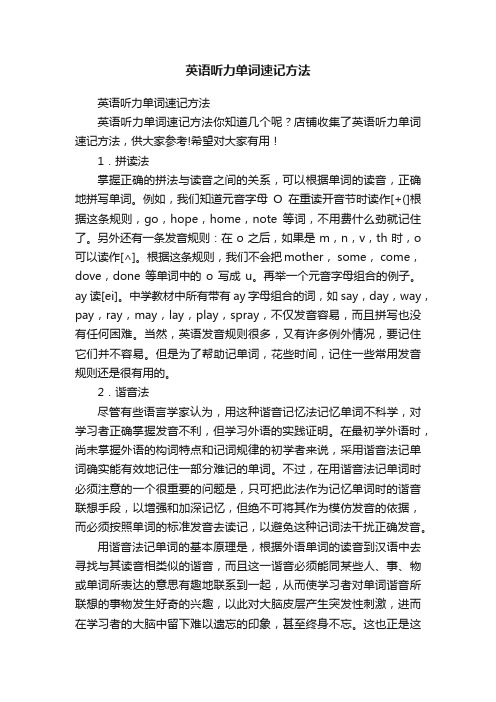
英语听力单词速记方法英语听力单词速记方法英语听力单词速记方法你知道几个呢?店铺收集了英语听力单词速记方法,供大家参考!希望对大家有用!1.拼读法掌握正确的拼法与读音之间的关系,可以根据单词的读音,正确地拼写单词。
例如,我们知道元音字母O在重读开音节时读作[+(]根据这条规则,go,hope,home,note等词,不用费什么劲就记住了。
另外还有一条发音规则:在o之后,如果是m,n,v,th时,o 可以读作[∧]。
根据这条规则,我们不会把mother, some, come,dove,done等单词中的o写成u。
再举一个元音字母组合的例子。
ay读[ei]。
中学教材中所有带有ay字母组合的词,如say,day,way,pay,ray,may,lay,play,spray,不仅发音容易,而且拼写也没有任何困难。
当然,英语发音规则很多,又有许多例外情况,要记住它们并不容易。
但是为了帮助记单词,花些时间,记住一些常用发音规则还是很有用的。
2.谐音法尽管有些语言学家认为,用这种谐音记忆法记忆单词不科学,对学习者正确掌握发音不利,但学习外语的实践证明。
在最初学外语时,尚未掌握外语的构词特点和记词规律的初学者来说,采用谐音法记单词确实能有效地记住一部分难记的单词。
不过,在用谐音法记单词时必须注意的一个很重要的问题是,只可把此法作为记忆单词时的谐音联想手段,以增强和加深记忆,但绝不可将其作为模仿发音的依据,而必须按照单词的标准发音去读记,以避免这种记词法干扰正确发音。
用谐音法记单词的基本原理是,根据外语单词的读音到汉语中去寻找与其读音相类似的谐音,而且这一谐音必须能同某些人、事、物或单词所表达的意思有趣地联系到一起,从而使学习者对单词谐音所联想的事物发生好奇的兴趣,以此对大脑皮层产生突发性刺激,进而在学习者的大脑中留下难以遗忘的印象,甚至终身不忘。
这也正是这种谐音记忆法的绝妙之处。
【示例】mouth[mauθ]嘴[联想:说话“冒失”的就是嘴]hair[hε+]头发[联想:头发真“黑氨]talk[t&:k]谈话[联想:谈话“套客”]sing[siR]唱[联想:唱歌应有“声”]wife[waif]妻子[联想:“我爱抚”的就是妻子]think[θiRk]想[联想:想时要“深刻”]behind[bi’haind]在…背后[联想:“被害的”是在背后]joke[d*ouk]笑话[联想:“揍客”就成了笑话]bus[b∧s]公共汽车[公共汽车俗称“帕斯”]gas[g$s]煤气;瓦斯[联想:煤气能害死人是“该死”]leave[li:v]离开[联想:“离吾”就是离开]3.前缀法前缀记忆法就是借助重要的外语构词词素——前缀来记忆单词的方法。
2020年人教版七年级英语下册Unit11 How was your school trip 单元练习题(附答案)

Unit11 How was your school trip?单元练习题一、听力(听力)(共20小题;共20分)一、听力选择(共20小题,计20分)(一)录音中有五个句子,每个句子听一遍,然后从每小题A、B、C中选出适合每个句子的答语。
1. A. It was excellent. B. It was cold. C. It was tall.2. A. I'm watching TV.B. I milked a cow.C. I usually go to the museum.3. A. Chickens. B. OK. I see. C. It was fun.4. A. I liked it very much. B. It was sunny. C. I visited my parents.5. A. No, I didn't. B. No, I don't. C. Yes, I was.(二)录音中有五组对话,每组对话听一遍,然后从每小题A、B、C中选出能回答每个问题的正确答案。
6. How was Susan's school trip?A. Exciting.B. Boring.C. Terrible.7. When did the girl feed chickens?A. Yesterday morning.B. Yesterday afternoon.C. Yesterday evening.8. What does Tom often do before breakfast?A. He reads books.B. He takes a shower.C. He goes for a walk.9. What did Bruce do yesterday afternoon?A. He took some photos.B. He grew vegetables.C. He picked strawberries.10. Who did Rick go to the farm with?A. His father.B. His uncle.C. His cousin.(三)录音中有一段对话,听对话两遍,然后从每小题A、B、C中选出能回答每个问题的正确答案。
九年级上册英语听力
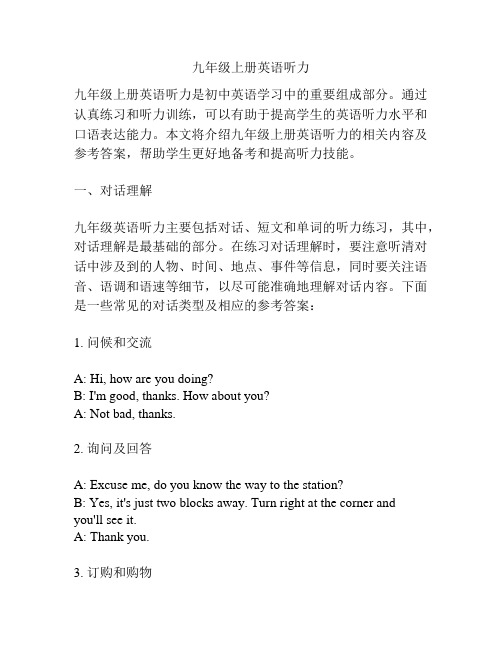
九年级上册英语听力九年级上册英语听力是初中英语学习中的重要组成部分。
通过认真练习和听力训练,可以有助于提高学生的英语听力水平和口语表达能力。
本文将介绍九年级上册英语听力的相关内容及参考答案,帮助学生更好地备考和提高听力技能。
一、对话理解九年级英语听力主要包括对话、短文和单词的听力练习,其中,对话理解是最基础的部分。
在练习对话理解时,要注意听清对话中涉及到的人物、时间、地点、事件等信息,同时要关注语音、语调和语速等细节,以尽可能准确地理解对话内容。
下面是一些常见的对话类型及相应的参考答案:1. 问候和交流A: Hi, how are you doing?B: I'm good, thanks. How about you?A: Not bad, thanks.2. 询问及回答A: Excuse me, do you know the way to the station?B: Yes, it's just two blocks away. Turn right at the corner andyou'll see it.A: Thank you.3. 订购和购物A: Can I help you?B: Yes, please. I'd like a medium-sized pepperoni pizza.A: Anything else?B: A large Coke, please.A: That'll be $15.50.4. 导游和询问A: Is this your first time in London?B: Yes, it is. Can you recommend some good tourist attractions? A: Sure. You should definitely go to the British Museum, the Tower of London, and Buckingham Palace.5. 约会及取消A: Do you want to go to the movies tonight?B: Yeah, that sounds great. What time?A: How about 7 o'clock?B: Sure, I'll meet you at the cinema then.二、短文听力短文听力是九年级英语听力中较难的部分,需要学生掌握一定的听力技巧和方法,并尽可能多地练习。
七年级上册英语人教版单词读音

七年级上册英语人教版单词读音一、概述英语是全球通用的语言之一,对于学习者来说熟练掌握英语单词的拼写和读音是至关重要的。
而对于七年级的学生来说,在学习英语的过程中,掌握单词的正确读音更是首要任务。
人教版的七年级上册英语教材中包含了大量的基础单词,正确地掌握这些单词的读音对于学生的英语学习有着重要的意义。
本文将介绍七年级上册英语人教版单词的读音规则,希望能够帮助学生们更好地掌握和记忆这些单词。
二、元音字母的读音规则1. 单一元音字母的读音规则a. a的读音在重读音节和单词末尾时,a的读音为/æ/,例如cat、map等单词。
在非重读音节时,a的读音为/ə/,例如sofa、banana等单词。
b. e的读音e的读音为/i:/,例如see、green等单词。
c. i的读音i的读音为/ɪ/,例如big、sit等单词。
d. o的读音o的读音为/ɒ/,例如dog、hot等单词。
e. u的读音u的读音为/ʌ/,例如bus、run等单词。
2. 复合元音字母的读音规则a. 本人的读音本人的读音为/eɪ/,例如r本人n、tr本人n等单词。
b. oa的读音oa的读音为/əʊ/,例如goat、boat等单词。
c. ee的读音ee的读音为/iː/,例如see、tree等单词。
d. ie的读音ie的读音为/aɪ/,例如pie、tie等单词。
e. ou的读音ou的读音为/aʊ/,例如house、mouse等单词。
三、辅音字母的读音规则1. 单一辅音字母的读音规则a. p的读音p的读音为/p/,例如pen、pig等单词。
b. t的读音t的读音为/t/,例如tap、cat等单词。
c. k的读音k的读音为/k/,例如kite、ask等单词。
d. f的读音f的读音为/f/,例如fun、frog等单词。
e. s的读音s的读音为/s/,例如sun、bus等单词。
2. 复合辅音字母的读音规则a. ch的读音ch的读音为/tʃ/,例如church、chicken等单词。
人教版英语九年级Unit11单元练习含答案
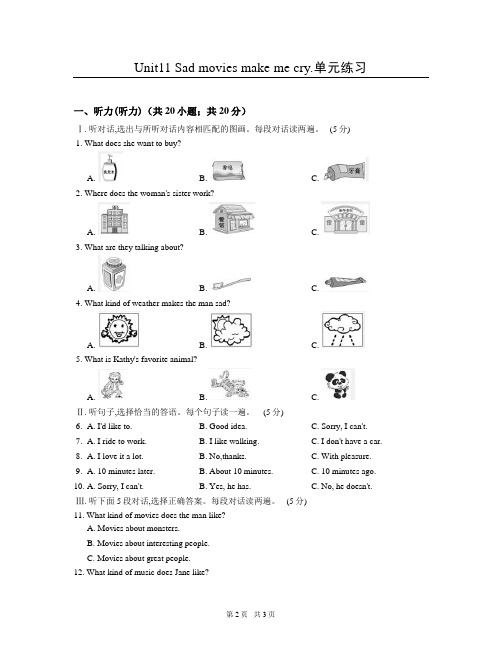
Unit11 Sad movies make me cry.单元练习一、听力(听力)(共20小题;共20分)Ⅰ. 听对话,选出与所听对话内容相匹配的图画。
每段对话读两遍。
(5分)1. What does she want to buy?A. B. C.2. Where does the woman's sister work?A. B. C.3. What are they talking about?A. B. C.4. What kind of weather makes the man sad?A. B. C.5. What is Kathy's favorite animal?A. B. C.Ⅱ. 听句子,选择恰当的答语。
每个句子读一遍。
(5分)6. A. I'd like to. B. Good idea. C. Sorry, I can't.7. A. I ride to work. B. I like walking. C. I don't have a car.8. A. I love it a lot. B. No,thanks. C. With pleasure.9. A. 10 minutes later. B. About 10 minutes. C. 10 minutes ago.10. A. Sorry, I can't. B. Yes, he has. C. No, he doesn't. Ⅲ. 听下面5段对话,选择正确答案。
每段对话读两遍。
(5分)11. What kind of movies does the man like?A. Movies about monsters.B. Movies about interesting people.C. Movies about great people.12. What kind of music does Jane like?A. Jane likes loud music.B. Jane likes noisy music.C. Jane likes soft and gentle music.13. Why do you think they would like to eat at the Blue Lagoon?A. Because the Blue Lagoon has the loudest music.B. Because the Blue Lagoon has the most comfortable seats and soft music.C. Because the Blue Lagoon has the most delicious food.14. What happened to Gina after she used the cream?A. She got pimples on her face.B. Her face became beautiful.C. She became more beautiful.15. What does Mary think of the new shampoo?A. Mary doesn't think her friend should try it.B. Mary thinks it doesn't work as well as the advertisement said.C. Mary thinks it works well.Ⅳ. 请听下面一段短文,根据短文内容完成表格,每个空格不超过3个单词。
人教版七年级英语上册听力原文

---------------------------------------------------------------最新资料推荐------------------------------------------------------人教版七年级英语上册听力原文Starter Unit 11b Listen and repeat. Conversation 1 Bob: Good morning, Helen! Helen: Hi, Bob! Conversation 2 Cindy: Good morning, Alice! Alice: Good morning, Cindy! Conversation 3 Dale: Hello, Frank! Hello, Eric! Frank/Eric: Good morning, Dale! 2a Listen and repeat. a, b, c, d, e, f, g, h 2b Listen and number the letters you a, b, c, d, e, f, g, h 3a Listen and number the pictures Conversation 1 Dale: Good morning, Helen! Helen: Good morning, Dale! Conversation 2 Frank: Good afternoon, Eric! Eric: Good afternoon, Frank! Conversation 3 Alice: Good evening, Bob! Bob: Good evening, Alice! 3c Listen to the conversation. Then with your partner. Cindy: Good afternoon, Dale! Dale: Hi, Cindy! How are you? Cindy: I’m fine, thanks. How are you? Dale: I’m OK.Starter Unit 21b 听录音并跟读。
新编初中英语听力训练七年级第一学期
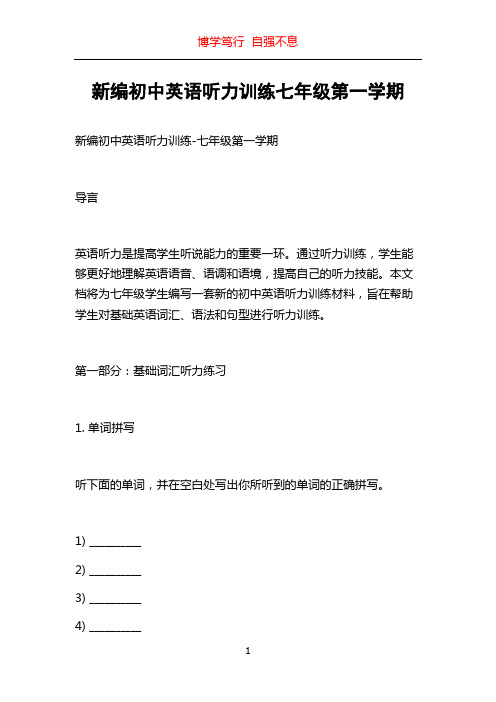
新编初中英语听力训练七年级第一学期新编初中英语听力训练-七年级第一学期导言英语听力是提高学生听说能力的重要一环。
通过听力训练,学生能够更好地理解英语语音、语调和语境,提高自己的听力技能。
本文档将为七年级学生编写一套新的初中英语听力训练材料,旨在帮助学生对基础英语词汇、语法和句型进行听力训练。
第一部分:基础词汇听力练习1. 单词拼写听下面的单词,并在空白处写出你所听到的单词的正确拼写。
1) __________2) __________3) __________4) __________5) __________2. 单词辨音听下面的句子,选择你听到的单词。
1) She is _________ A. tall B. tell2) My favorite color is _________ A. red B. read3) Please _________ the window. A. close B. clothes4) I want to _________ a book. A. read B. red5) He can _________ the guitar. A. play B. plays3. 词义辨析听下面的句子,选择与你听到的句子意思相同或接近的选项。
1) She is a good student. A. She is an excellent student. B. She is a bad student.2) What is the capital of China? A. Where is the capital of China? B. How many capitals are there in China?3) I don't like apples. A. I like apples. B. I hate apples.4) He is from England. A. He is English. B. He is American.5) Can you speak Chinese? A. Do you speak Chinese? B. Can you understand Chinese?第二部分:基础句型听力练习1. 句子理解听下面的句子,选择正确的图片。
九年级英语听力材料及参考答案

英语听力材料(一) 听句子,选画面。
你将听到五个句子,你将听到五个句子,请你根据所听到的内容,请你根据所听到的内容,请你根据所听到的内容,选择与画面内容意选择与画面内容意思相符的选项。
每个句子仅读一遍。
思相符的选项。
每个句子仅读一遍。
1. . Many Many Many people people people like like like doing doing doing sports. sports. sports. Look! Look! Look! Some Some Some people people people are are are riding riding riding bikes bikes bikes to to keep healthy . 2. This kind of animal is so lovely. Its name is koala and it lives in Australia. 3. In recent years, mobile phone is very popular in China. 4. Every year many trees are planted on March the twelfth. 5. The Sixteenth Asian Games was held in Guangzhou last year. (二) 听句子,选答语。
你将听到五个句子,请你根据所听到的内容,选择恰当的答语。
每个句子仅读一遍。
每个句子仅读一遍。
6. How old is your grandmother? 7. What color are the pants? 8. I’m so happy . I’m going to study in a new school this September.9. Thank you for showing me your family photos.10.Do you often play computer games? (三)对话理解。
七年级到九年级的英语单词

七年级到九年级的英语单词一、Starter Unit 1 - 3。
1. good [gud] adj. 好的;令人满意的。
2. morning ['mɔ:niŋ] n. 早晨;上午。
3. hi [hai] int. (用于打招呼)嗨;喂。
4. hello [hə'ləu] int. 你好;喂。
5. afternoon [,ɑ:ftə'nu:n] n. 下午。
6. evening ['i:vniŋ] n. 晚上;傍晚。
7. how [hau] adv. 怎样;如何;多么。
8. are [ɑ:(r)] v. 是。
9. you [ju:] pron. 你;你们。
10. I [ai] pron. 我。
11. am [æm] v. 是。
12. fine [fain] adj. 健康的;美好的。
13. thanks [θæŋks] n. 感谢;谢谢。
14. OK [əʊ'keɪ] interj. & adj. 好;可以。
二、Unit 1。
1. name [neim] n. 名字;名称。
2. nice [nais] adj. 令人愉快的;宜人的。
3. to [tu:, tə] prep. 常用于原形动词之前,表示该动词为不定式。
4. meet [mi:t] v. 遇见;相逢。
5. too [tu:] adv. 也;又;太。
6. your [jɔ:(r)] pron. 你的;你们的。
7. his [hiz] pron. 他的。
8. her [hə:(r)] pron. 她的。
9. and [ænd] conj. 和;又;而。
三、Unit 2。
1. sister ['sistə(r)] n. 姐;妹。
2. mother ['mʌðə(r)] n. 母亲;妈妈。
3. father ['fɑ:ðə(r)] n. 父亲;爸爸。
七年级英语听力训练答案

三一文库()/初中一年级 〔七年级英语听力训练答案[1]〕一、听力测试(共25小题,计30分)第一节:听句子,选择正确的图片(共5小题,计5分),每个句子读两遍。
1. A. B. C./u#/ / ei / / #u /2. A. B. C.3. A. B. C.4. A. B. C.5. A. B. C.第二节:听句子,判断图片与所听内容是否相符,是选“A”,否选“B”(共5小题,计5分),每个句子读两遍。
6. 7. 8. 9. 10.第三节:听句子,选答语(共5小题,计5分),每个句子读两遍。
11. A. Bob. B. Alice. C. John.12. A. Yes, I do. B. Yes, she is. C. No, she doesn’t.13. A. Good. B. Nine o’clock. C. Under the bed.14. A. English. B. Green. C. Basketball.15. A. Bye-bye. B. Me, too. C. Thank you.第四节:听小对话,回答问题(共5小题,计5分),每段对话读两遍。
16. What’s Cindy’s favorite color?A. Black.B. White.C. Purple.17. Does Ken like fishing?A. No, he doesn’t.B. We don’t know.C. Yes, he does.18. Who teaches Dave science?A. Miss Zhang.B. Mr. Zhang.C. Mrs. Zhang.19. What does Jim like eating?A. Oranges.B. Bananas.C. Apples.20. What does Lucy think of painting(画画)?A. Too difficult.B. Very interesting.C. A little boring.第五节:听长对话,回答问题(共5小题,计10分),每段对话读两遍。
人教版英语九年级Unit11单元练习(含答案)
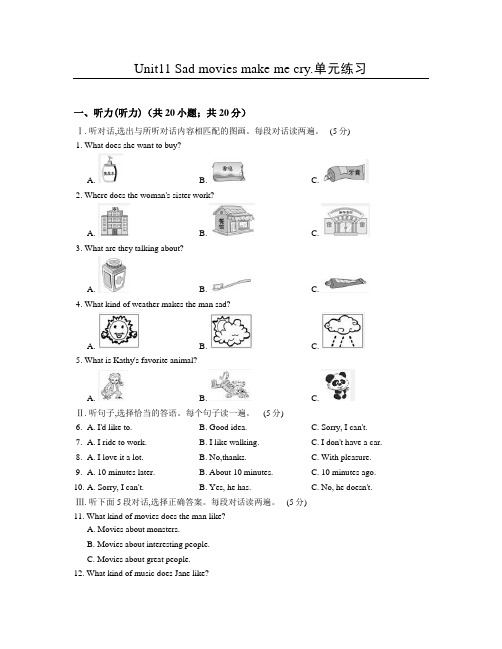
Unit11 Sad movies make me cry.单元练习一、听力(听力)(共20小题;共20分)Ⅰ. 听对话,选出与所听对话内容相匹配的图画。
每段对话读两遍。
(5分)1. What does she want to buy?A. B. C.2. Where does the woman's sister work?A. B. C.3. What are they talking about?A. B. C.4. What kind of weather makes the man sad?A. B. C.5. What is Kathy's favorite animal?A. B. C.Ⅱ. 听句子,选择恰当的答语。
每个句子读一遍。
(5分)6. A. I'd like to. B. Good idea. C. Sorry, I can't.7. A. I ride to work. B. I like walking. C. I don't have a car.8. A. I love it a lot. B. No,thanks. C. With pleasure.9. A. 10 minutes later. B. About 10 minutes. C. 10 minutes ago.10. A. Sorry, I can't. B. Yes, he has. C. No, he doesn't. Ⅲ. 听下面5段对话,选择正确答案。
每段对话读两遍。
(5分)11. What kind of movies does the man like?A. Movies about monsters.B. Movies about interesting people.C. Movies about great people.12. What kind of music does Jane like?A. Jane likes loud music.B. Jane likes noisy music.C. Jane likes soft and gentle music.13. Why do you think they would like to eat at the Blue Lagoon?A. Because the Blue Lagoon has the loudest music.B. Because the Blue Lagoon has the most comfortable seats and soft music.C. Because the Blue Lagoon has the most delicious food.14. What happened to Gina after she used the cream?A. She got pimples on her face.B. Her face became beautiful.C. She became more beautiful.15. What does Mary think of the new shampoo?A. Mary doesn't think her friend should try it.B. Mary thinks it doesn't work as well as the advertisement said.C. Mary thinks it works well.Ⅳ. 请听下面一段短文,根据短文内容完成表格,每个空格不超过3个单词。
初中全部英语单词表(789年级-含音标可打印可修改)
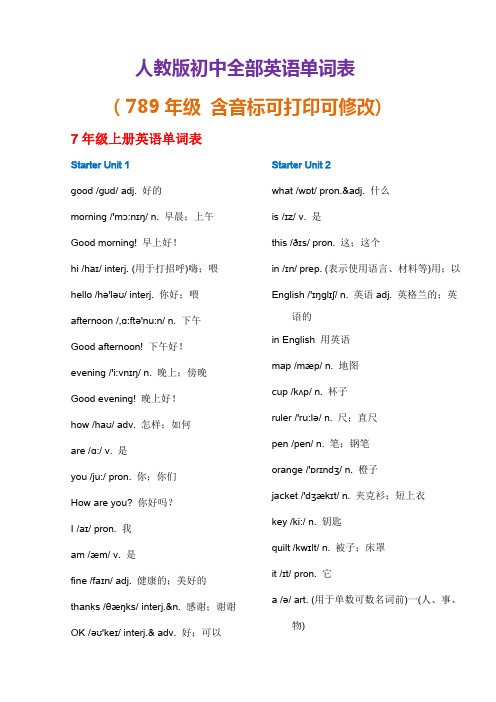
人教版初中全部英语单词表(789年级含音标可打印可修改) 7年级上册英语单词表Starter Unit 1good /gʊd/ adj. 好的morning /'mɔ:nɪŋ/ n. 早晨;上午Good morning! 早上好!hi /haɪ/ interj. (用于打招呼)嗨;喂hello /hə'ləʊ/ interj. 你好;喂afternoon /,ɑ:ftə'nu:n/ n. 下午Good afternoon! 下午好!evening /'i:vnɪŋ/ n. 晚上;傍晚Good evening! 晚上好!how /haʊ/ adv. 怎样;如何are /ɑ:/ v. 是you /ju:/ pron. 你;你们How are you? 你好吗?I /aɪ/ pron. 我am /æm/ v. 是fine /faɪn/ adj. 健康的;美好的thanks /θæŋks/ interj.&n. 感谢;谢谢OK /əʊ'keɪ/ interj.& adv. 好;可以Starter Unit 2what /wɒt/ pron.&adj. 什么is /ɪz/ v. 是this /ðɪs/ pron. 这;这个in /ɪn/ prep. (表示使用语言、材料等)用;以English /'ɪŋglɪʃ/ n. 英语adj. 英格兰的;英语的in English 用英语map /mæp/ n. 地图cup /kʌp/ n. 杯子ruler /'ru:lə/ n. 尺;直尺pen /pen/ n. 笔;钢笔orange /'ɒrɪndʒ/ n. 橙子jacket /'dʒækɪt/ n. 夹克衫;短上衣key /ki:/ n. 钥匙quilt /kwɪlt/ n. 被子;床罩it /ɪt/ pron. 它a /ə/ art. (用于单数可数名词前)一(人、事、物)that /ðæt/ pron. 那;那个spell /spel/ v. 用字母拼;拼写please /pli:z/ interj. (用于客气地请求或吩咐)请Starter Unit 3color /'kʌlə/ n. (=colour) 颜色red /red/ adj.& n. 红色(的)yellow /'jeləʊ/ adj.& n. 黄色(的)green /gri:n/ adj.& n. 绿色(的)blue /blu:/ adj.& n. 蓝色(的)black /blæk/ adj.& n. 黑色(的)white /waɪt/ adj.& n. 白色(的)purple /'pɜ:pl/ adj.& n. 紫色(的)brown /braʊn/ adj.& n. 棕色(的);褐色(的)the /ðɪ: ðə/ art. 指已提到或易领会到的人或事now /naʊ/ adv. 现在;目前see /si:/ v. 理解;明白can /kæn/ mod al v. 能;会say /seɪ/ v. 说;讲my /maɪ/ pron. 我的Unit 1name /neɪm/ n. 名字;名称nice /naɪs/ adj. 令人愉快的;宜人的to /tu:/ 常用于原形动词之前,该动词为不定式meet /mi:t/ v. 遇见;相逢too /tu:/ adv. 也;又;太your /jɔ:/ pron. 你的;你们的Ms. /mɪz/ (于女子的姓名前,不指明婚否)女士his /hɪz/ pron. 他的and /ænd/ conj. 和;又;而her /hɜ:/ pron, 她的yes /jes/ interj. 是的;可以she /ʃi:/ pron. 她he /hi:/ pron. 他no /nəʊ/ interj. 不;没有;不是not /nɒt/ adv. 不;没有zero /'zɪərəʊ/ num. 零one /wʌn/ num. 一two /tu:/ num. 二three /θri:/ num. 三eɪght /eɪt/ num. 八nine /naɪn/ num. 九telephone /'telɪfəʊn/ n. 电话;电话机number /'nʌmbə/ n. 号码;数字four /fɔ:/ num. 四five /faɪv/ num. 五six /sɪks/ num. 六seven /'sevn/ num. 七phone /fəʊn/ n. 电话;电话机telephone/phone number 电话号码first /fɜ:st/ adj. 第一first name 名字last /lɑ:st/ adj. 最后的;末尾的last name 姓friend /frend/ n. 朋友China /'tʃaɪnə/ 中国middle /'mɪdl/ adj. 中间的;中间school /sku:l/ n. 学校middle school 中学;初中Unit 2sister /'sɪstə/ n. 姐;妹mother /'mʌðə/ n. 母亲;妈妈father /'fɑ:ðə/ n. 父亲;爸爸parent /'peərənt/ n. 父(母)亲brother /'brʌðə/ n. 兄;弟grandmother /'grænmʌðə/ n.(外)祖母;奶奶grandfather /'grænfɑ:ðə/ n. (外)祖父;爷爷;grandparent/'grænpeərənt/ n.祖父(母);family /'fæməlɪ/ n. 家;家庭those /ðəʊz/ pron. 那些who /hu:/ pron. 谁;什么人oh /əʊ/ interj. 哦;啊these /ði:z/ pron. 这些they /ðeɪ/ pron. 他(她、它)们well /wel/ interj. 嗯;好吧have /hæv/ v. 经受;经历Have a good day! (表示祝愿)过得愉快!bye /baɪ/ interj. (=goodbye)再见son /sʌn/ n. 儿子cousin /'kʌzn/ n. 堂兄(弟、姐、妹);表兄grandpa /'grænpɑ:/ n. (外)祖父;爷爷;外公mom /mɒm/, /mɑ:m/ n. (=mum)妈妈aunt /ɑ:nt/ n. 姑母;姨母;伯母;婶母;舅母grandma /'grænmɑ:/ n.(外)祖母;奶奶;外婆;dad /dæd/ n. 爸爸uncle /'ʌŋkl/ n. 舅父;叔父;伯父;姑父;舅父daughter /'dɔ:tə/ n. 女儿here /hɪə/ adv. (用以介绍人或物)这就是;在这里photo /'fəʊtəʊ/ n. 照片of /ɒv, əv/ prep. 属于(人或物);关于(人或物)next /nekst/ adj.&n. 下一个(的);接下来(的)picture /'pɪktʃə/ n. 照片;图画girl /gɜ:l/ n. 女孩dog /dɒg/ n. 狗Unit 3pencil /'pensl/ n. 铅笔book /bʊk/ n. 书eraser /ɪ'reɪzə/ n. 橡皮box /bɒks/ n. 箱;盒pencil box 铅笔盒;文具盒schoolbag /'sku:lbæg/ n. 书包dictionary /'dɪkʃənərɪ/ n. 词典;字典his /hɪz/ pron. 他的mine /maɪn/ pron. 我的hers /hɜ:z/ pron. 她的excuse /ɪk'skju:z/ v. 原谅;宽恕me /mi:/ pron. (I的宾格)我excuse me 劳驾;请原谅thank /θæŋk/ v. 感谢;谢谢teacher /'ti:tʃə/ n. 老师;教师about //ə'baʊt/ prep. 关于What about...?(询问消息或提出建议..怎么样?yours /jɔ:z/ pron. 你的;你们的for /fɔ:/ prep. 为了;给;对thank you for... 为......而感谢help /help/ v.&n. 帮助;援助welcome /'welkəm/ adj. 受欢迎的You're welcome. 别客气。
九年级全册英语笔记知识点

九年级全册英语笔记知识点一、单词拼写在学习英语的过程中,掌握单词的拼写是非常重要的。
以下是九年级全册中常见的一些单词及其拼写:1. Vocabulary (词汇)2. Grammar (语法)3. Pronunciation (发音)4. Comprehension (理解)5. Fluency (流利)6. Conversation (对话)7. Reading (阅读)8. Writing (写作)9. Listening (听力)10. Speaking (口语)二、语法知识点了解和掌握英语的基本语法规则对于正确的语言表达至关重要。
以下是九年级全册中常见的一些语法知识点:1. Present simple tense (一般现在时)2. Past simple tense (一般过去时)3. Present continuous tense (现在进行时)4. Past continuous tense (过去进行时)5. Future simple tense (一般将来时)6. Modal verbs (情态动词)7. Conditional sentences (条件句)8. Reported speech (间接引语)9. Passive voice (被动语态)10. Relative clauses (关系从句)三、阅读技巧阅读是提高英语能力的重要途径,以下是九年级全册中关于阅读的一些技巧和知识点:1. Skimming (略读)2. Scanning (快速查找)3. Guessing meaning from context (通过上下文猜词义)4. Identifying main ideas and supporting details (辨认主旨和主要细节)5. Making inferences (推断)6. Deducing vocabulary through prefixes and suffixes (通过前缀和后缀猜测单词意思)7. Understanding different text types (理解不同类型的文章)8. Making notes while reading (阅读时做笔记)四、写作技巧良好的写作技巧可以让我们更清晰、准确地表达自己的想法和观点。
牛津版英语七年级下—U9-U11复习—语音总结—阅读综合—听力

1. 7B U9-U11基础综合U9-U11易错题整理I. Choose the best answer.(选择最恰当的答案)( ) 1. The population of China is ______ than any other country in the world.(★)A)less B) larger C) smaller D) more ( ) 2. Mary writes better than ______ in her class.(★★)A)any other student B) any studentC) any other boy D) anyone( ) 3. Xiao Li couldn’t jump ______ Xiao Wang in the long jump.(★)A)as long as B) so long as C) as far as D) so farther as ( ) 4. Which is ______ to learn, fishing or swimming?(★)A)faster B) more easily C) the easier D) easier ( ) 5. John didn’t run as _______ as Jane.(★★)A)faster B) quickly C) more quickly D) quick ( ) 6. Jenny goes to school ______ than any other student in her class.(★)A)early B) earlier C) earliest D) the earliest ( ) 7. ______ classroom is much bigger than ______.(★★)A)We, them B) Ours, their C) Our, theirs D) Ours, theirs ( ) 8. Miss Black is a friend of ______ .(★★)A)my aunt B) her C) herself D) my aunt’s ( ) 9. ______ it cost?(★)A)How much does B) How much isC) How many is D) How many does( ) 10. Jane runs faster than ______ in her class.(★)A)any other student B) any other studentsC) any of the other student D) any others( ) 11. Patrick is a cousin of ______..(★★)A)me B) mine C) my D) I( ) 12. ______ did you go for your winter holiday?.(★★)A)When B) Where C) What D) How( ) 13. Susan’s diet is healthier than ______.(★★)A)me B) mine C) her D) hers ( ) 14. Uncle Peter is ______.(★)A)a friend of my father B) a friend of mine fatherC) a friend of my father’s D) a friend of mine father’s ( ) 15. The Blacks got back to London ______ a winter night.(★★)A)at B) for C) on D) in ( ) 16. My mother gets up ______ in my family. (★★)A)early B) earlier C) earliest D) the earlier ( ) 17. Kitty has ______ his brother.(★)A)apples as many as B) as polite as possiblyC) apples as much as D) as many apples as( ) 18. The old man was found ______ a cold morning.(★★)A) in B) on C) at D) /( ) 19. Everyone should do______ best to help each other. (★)A)one’s B) ones’C) his D) him ( ) 20. Whose bag is it? Perhaps it’s ______ .(★★)A)he’s B) his C) him D) himselfII. Rewrite the following sentences as required.(根据要求改写句子)1.The students would like to have more school picnics.(对划线部分提问)_______ ______ the students like to have?2.It would be necessary to visit more places of interest. (改为否定句)It ______ ______ necessary to visit more places of interest.3. You can make some changes to it yourselves. (改为一般疑问句)______ you ______ any changes to it yourselves?4. The students had a history lesson yesterday. (改为一般疑问句)______ the students ______ a history lesson yesterday?5. We go to the supermarket twice a week. (对划线部分进行提问)______ ______ do you go to the supermarket?6. The clouds are moving quickly. (改为一般疑问句)______ the clouds ______ quickly?7. The children in Class 2 are running on the playground. (对划线部分进行提问)______ are the children in Class 2 ______?8. This T-shirt is not as expensive as that one. (保持句意基本不变)That T-shirt is ______ ______ than this one.9. No one can sing better than him in his school. (保持句意基本不变)He ______ ______ in his school.10.I hope that I can become a scientist in the future. (保持句意基本不变)I hope ______ ______ a scientist in the future.11. If you come to Beijing, I’ll be happ y to be your guide. (保持句意基本不变)If you come to Beijing, I’ll ______ ______ to be your guide.12. That sounds very attractive. (改为反意疑问句)That sounds very attractive, ______ ______?13. We are planning to take a trip to Shanghai. (对划线部分进行提问)______ are you planning to ______?14.The poor man has worked alone in the factory. (对划线部分进行提问)______ has the poor man ______ in the factory?15. We have already found a good place to stay. (改为否定句)We ______ ______ a good place to stay ______.HomeworkI. Choose the best answer.(选择最恰当的答案)( ) 1. Peter runs _______ in his class now.A)more fast B) more fasterC) much faster D) fastest( ) 2. We usually have a gala ______ the evening of September 30.A)in B) on C) at D) for ( ) 3. I’m afraid your watch is ______.A)five minutes slow B) five minutes slowerC) five minute’s slower D) five minutes’ slow( ) 4. Jack skates ______ as his father.A)so well B) so good C) as well D) as good ( ) 5. The roads in this area are wider than ______.A)that area B) those in that areaC) that in that one D) those areas( ) 6. They are playing football. Let’s go and join ______..A)they B) them C) their D) themselves( ) 7. China is becoming ______ in the world.A)important and important B) more important and importantC) more and more important D) more important and more important( ) 8. China is one of ______ in the world.A)large country B) largest countryC) the largest country D) the largest countries( ) 9. Uncle Peter is ______.A)a friend of my father B) a friend of mine fatherC) a friend of my father’s D) a friend of mine father’s( ) 10. In my opinion, the Summer Palace looks ______ than Beihai Park.A)beautiful B) more beautifulC) beautifully D) much beautiful( ) 11. Kitty is a friend of ______.A) us B) we C) ours D) ourselves( ) 12. Lian Zhan, chairman of the KMT, enjoyed the Huangpu River ______ the night of May 1st.A)on B) in C) at D) over( ) 13. This is ______ film I have ever seen.A)funnier B) the most funnyC) the funniest D) funny( ) 14. Betty runs ______ in her class now.A)more slowly B) the slowestC) most slowly D) slower( ) 15. Beijing is one of the ______ famous _______ in the world.A)more, city B) more, cities C) most, cities D) most, city( ) 16. Betty looks a little ______ than she was a month ago.A)thin B) thiner C) thinner D) thinnest( ) 17. Asia is one of ______ continents in the world.A)largest B) large C) larger D) the largest( ) 18. There is a ______ beside the house.A)children’s playground B) childrens’ playgroundC) child’s playground D) childs’ playground( ) 19. I really enjoy ______ Jay Chou’s songs.A)to listen to B) to listenC) listening to D) listening( ) 20. The fil m is ______, but my parents aren’t ______ in it.A)interested, interesting B) interesting, interestedC) interesting, interesting D) interested, interestedII. Complete the following passage with the words in the box. Each word can only be used once . (选择适当的单词完成下列的内容,将单词前的编号填入空格内,每空格限填一词,每个单词只能用一次)Near the North Pole there are two ___1___: winter and summer. The summer days are long. For more than two months, the sun ___2___ goes down, and there are no nights. The people there have warm clothes. They make most of their clothes by ___3___. They make them from the skins of ___4___. From skins, they make coats and hats and even shoes. In this cold weather, trees can’t ___5___. The lif e is ___6___ for the people there.1.______2.______3.______4.______5.______6.______Dear Teddy,Are you surprised to hear from me? I have not heard from you ___1___ the beginning of the summer ___2___. How are you getting on with your sister? How are your parents? Is your brother Bill ___3___ from Canada yet?My stamp collection is ___4___ bigger and bigger. I have collected stamps of more than forty ___5___ countries. I am very ___6___ to know you are going to give me some foreign stamps, but still have not received the stamps of Nepal which you said to post me. Have you sent them off yet?Please write to me soon.Yours, Zhou Wen1. ______2.______3.______4.______5.______6.______A somethingB surprisedC moreD lendE upF sadA little boy greeted his father when he returned from work, “Daddy, how much do you make an hour?”Greatly ___1___, the father said, “Look, son, not even your mother knows that. Don’t bot her(打扰)me now. I’m tired.”“But Daddy, just tell me please! How much do you make an hour?” the boy insisted (坚持).The father finally gave ___2___ and answered, “Twenty dollars per hour.”“Okay, Daddy. Could you ___3___ me ten dollars?” the boy asked.“So that was the reason you asked how much I get, right? Go to sleep and don’t bother me any ___4___!”It was dark and the father thought maybe his son wanted to buy ___5___. So the father went to his son’s room.“Are you asleep, son? Here’s the money you asked for earlier,” the father said.“Thanks, Daddy!” the son happily put his hand under his pillow(枕头)and took out some money.“Now I have twenty dollars!” the boy said to his father. “Daddy, could you sell me one hour of your time?”1.______2.______3.______4.______5.______字母或字母组音标例词c /s/ city nice /k/ cold pictures /s/ soup else /z/ music loseg /g/ girl big /dʒ/ large Germanh/h/ house head 不发音hour exhibition2. 语音总结PracticeI. Read the word and circle the correct sound for the underlined letter.(选择与划线部分字母的音标)A B A B1 lightning /ŋ//ŋg/2 electricity /k/ /s/3 punch /tʃ/ /k/4 carriage /g/ /dʒ/5 through /θ//ð/6 whole /w/ /h/6 slide /s/ /z/ 8 suitcase /k/ /s/9 ground /dʒ/ /g/ 10 while /w/ /h/II. Read the sounds and write the words.(根据音标拼写单词)1 /bɜːd/______2 /lu:z/______3 /tʃeə/______4 /wɒt/______5 /ðæt/______6 /pleɪt/______7 /ri:d/______ 8 /kʌt/______9 /lɑ:dʒ/______ 10 /sɒŋ/_______11 /nju:/______ 12 /ʃɔːt/______HomeworkChoose the right answer.(选择划线部分发音与其他不同的单词)( ) 1. A. where B. who C. white D. why( ) 2. A. those B. thank C. there D. with( ) 3. A. ache B. chemical C. child D. school( ) 4. A. balance B. headache C. decade D. courage( ) 5. A. athlete B. southern C. breathe D. those( ) 6. A. worthy B. health C. further D. through( ) 7. A. birthday B. bathe C. therefore D. neither( ) 8. A. honest B. host C. habit D. happy( ) 9. A. charge B. toothache C. search D. China( ) 10. A.girl B. gentleman C. orange D. Geography3. 阅读综合A. Choose the best answer according to the passage.(根据文章选择最佳答案)Shay Mitchell is a Canadian actress and model. She is well-known for starring Pretty Little Liars (美少女的谎言), one of the most popular American TV series right now.Even as a young child, Shay was interested in acting, declaring to her parents that she would pursue such a career.“I grew up in a mostly white neighbourhood, but my mom is Filipion-Spanish and my dad is Irish” Shay explains. “Most of my schoolmates had white skins with blonde hair and blue eyes. So, in my high school, I was an outcast. Nobody wanted to hang out have lunch with me.”At that time, Shay lost her confidence and felt very sad. It was a few works from her grandmother that helped her find confidence. Her grandmother told her that it’s great to be different. That’s what’s going to set her apart and make her more special.( ) 1. Shay Mitchell is well-known for ______.A, her skin color B. working as a teen modelC. starring a popular American TV seriesD. her grandmother( ) 2. Shay was interested in acting when ______.A, she was a young child B. she started a career as an actressC. she studied hard at schoolD. landed a leading role in Pretty little Liars. ( ) 3. In paragraph 3, by saying “I was an outcast”, Shay means ______.A, she was strange B. she was ignored by othersC. she was outstandingD. she was outgoing( ) 4. Shay’s ______ helped her find confidence again.A, parents B. different skin colorC. grandmotherD. neighbourhood( ) 5. We can learn from this article that ______.A.People in a white neighbourhood are not friendlyB.Shay’s parents helped her a lot on her school workC.Shay’s schoolmates want to hang out and have lunch with her nowD.Passion for acting and confidence makes Shay a strong personB. Choose the words or expressions and complete the passage(选择最恰当的单词或词语完成短文)The Japanese pay much attention to the ___1___ of telephone numbers. They like their bath house, ___2___, to use 4626, because when it is read in Japanese, it has the same pronunciation as “have a good bath”.___3___ these numbers are connected with something nice, people can remember them very easily. So they have become advertisements for the shops.On the other hand, there are also telephone numbers which are regarded as ___4___ ones. The number 1564 has the sound of “kill people” ___5___ the number 4219 sounds like “people die”.At present, there are about 44 million telephones in Japan, yet it is ___6___ for everyone to have a lucky number. So these numbers can be sold as goods and the price can reach as much as 222 thousand Japanese yen.( ) 1. A. price B. length C. luck D. owner( ) 2. A. such as B. in fact C. in their opinion D. for example( ) 3. A. though B. since C. where D. until( ) 4. A. lucky B. expensive C. bad D. common( ) 5. A. while B. and C. but D. so( ) 6. A. necessary B. impossible C. surprising D. importantC. Read the passage and fill in the blanks with suitable words(根据所给单词的首字母填空)Cindy wanted a job. She thought that if she had a job after school, she could earn(挣)her o___1___ money. Then she wouldn’t have to ask her parents for money.Some of her friends worked when school was finished for the day. So Cindy went to some of the stores and asked for work. She f___2___ got a job in a cafe. She was very happy.She came home and told her parents, “Mum, Dad, I got a job at a cafe.”“Congratulations!” they said. They asked her lots of questions about the job and about people who owned the store.“Don’t worry, Mum,” Cindy said, “I think they are nice people and I will be happy there.”Her parents a___3___ her to take the job.After the first day, they asked her if it was good.“It was wonderful,” said Cindy. “The owners were very friendly. They showed me how to do things and helped me all the time.”Two days later, Cindy’s parents saw her come home from job. She looked u___4___..“What’s the matter?” they asked her.“I am tired,” she said. “The owners of the cafe are making me work too hard. When I started, they were very friendly, but now they are bossy(专横的). They watched me all the time and complained when something goes wrong, even if it isn’t my fault. Sometimes they even criticize(批评)me in front of c___5___. Today a friend from school came to the cafe and I was telling her what was on the menu, and the owner told me to stop talking to my friend and get on with my work. It isn’t f___6____!”“Don’t you like working there now?” asked her mother.“Yes, I do like working there,” said Cindy. “I don’t like the owners working there!”D. Answer the questions according to the passage. (根据文章回答问题)Dick’s uncle lived in the country. Once Dick went to stay with him for a few weeks. They often went for a walk or for a drive in a car. When they passed somebody, his uncle waved. Dick was surprised and said, “Uncle George, you know everybody here. Where did you meet them all?”“I don’t know all these people,” said his uncle.“Then why do you wave to them?” asked Dick.“Well, Dick,” answered his uncle. “When I wave to someone, he is pleased if he knows me. He continues his journey with a happy heart. But when I wave to someone, and he doesn’t know me, and he is surprised and says to himself, “Who is that man? Why did he wave to me? So he has something to thin k about during the rest of his journey, and that makes his journey seem shorter, so I make everybody happy.”1.How long did Dad stay with his uncle?_____________________________________________2.Why was Dick surprised?_____________________________________________3.Did his uncle know all people there?_____________________________________________4.Why did his uncle wave to everybody?_____________________________________________5.How do you think about Dick’s uncle?_____________________________________________HomeworkB. Choose the words or expressions and complete the passage(选择最恰当的单词或词语完成短文)The sun was shining quite brightly as Mrs. Grant left her house, so she decided not to ___1___ an umbrella with her. She got on the bus to the town and before long it began to rain. The rain had not stopped when the bus arrived at the market half an hour later. Mrs. Grant stood up and absentmindedly(心不在焉地)picked up the umbrella that was ___2___ on the seat in front of her.A cold voice said loudly, “That is mine, madam!”Suddenly remembering that she had come out without her umbrella. Mrs. Grant felt sorry for what she had done, trying at the same time to take no notice of the unpleasant ___3___ the owner of the umbrella was giving her.When she got off the bus, Mrs. Grant made straight for a shop where she could buy an umbrella. She found a pretty one and bought it. Then she decided to buy another as a present for her daughter. Afterwards she did the rest of her ___4___ and had lunch in a restaurant.In the afternoon she got on the homeward bus with the two umbrellas under her arm, and sat down. Then she saw that, by a curious coincidence(巧合), she was sitting next to the woman who had made her feel ___5___ that morning.That woman now looked at her, and then at the umbrellas.” You’ve had quite a good ___6___,” she said.( ) 1. A) take B) bring C) keep D) leave( ) 2. A) hanging B) appearing C) dropping D) losing( ) 3. A) reply B) call C) suggestion D) look( ) 4. A) hiking B) shopping C) trying D) searching( ) 5. A) jealous B) bored C) satisfied D) uncomfortable( ) 6. A) day B) meal C) journey D) presentC. Read the passage and fill in the blanks with suitable words(在短文的空格内填入适当的词,使其内容通顺,每空格限填一词,首字母已给)I was at the public swimming pool, and was going to get dressed and go home. Because it was a cloudy afternoon, and it was getting quite late, the pool was almost e___1___. There was no lifeguard(救生员)there then, and the only other swimmer was an eight-year-old girl.As I got out of the pool and began to dry myself, the girl jumped into the water again. After some time,she still hadn’t come out, s___2___ I began to worry. I ran to the end of the pool, and saw her struggling under the water. I jumped in to help her, and f___3___ that her long hair was caught by something at the bottom of the pool. I tried to help her get free, but I f___4___.I swam to the surface and shouted for help, but there was nobody there. I n___5___ a bottle on a table near the pool, so I climbed out, broke the bottle and jumped back into the water with a piece of the broken glass. I c___6___ the girl’s hair with it and set her free and dragged(拖拉)her to the surface.Then the lifeguard arrived. He called the girl’s p___7___. When they heard what had happened, they kept than king me for saving the girl’s life.Tradition vs. fashionPart 1Listening ComprehensionI.Listen and choose the right picture. (根据你所听到的内容,选出相应的图片)1.______2.______3._______4.______5._______6.______II. Listen to the dialogue and choose the best answer to the question you hear. (根据你所听到的问 题,选出最恰当的答案) () 1. A. More display boards.B. More interesting clubs.C. More books and Children’s magazines.D. Less homework. ( ) 2. A. 2.5 yuan. B. 3 yuan.C. 5 yuan.D. 3.5 yuan. () 3. A. In Grade 9.B. In Grade 8.C. In Grade 7.D. In Grade 6.4.听力( ) 4. A. Linda. B. Fred. C. Both. D. Neither. ( ) 5. A. 6:30. B. 6:25. C. 6:35. D. 6:20.( ) 6. A. At a restaurant. B. In an office.C. At the post office.D. At the police station.( ) 7. A. Bad. B. Fine. C. Exciting. D. It’s OK. ( ) 8. A. In a bookstore. B. In a library.C. In a restaurant.D. In a cafeteria.III. Listen to the passage and tell whether the following statements are true or false. (判断下列句子是否符合你听到的短文内容,符合的用T表示,不符合的用F表示)( ) 1. The aeroplane was flying from London to Los Angeles.( ) 2. There are four engines on the plane.( ) 3. The aeroplane can’t fly on only three engines.( ) 4. When the third engine stopped, one of the passengers went to see the captain.( ) 5. If the last engine stopped, all the passengers would die.( ) 6. In the end, the aeroplane arrived in London two hours late.IV. Listen to the passage and complete the following sentences.(听短文,完成下列内容,每空格限填一词)1.German is a ______ country with a lot of ______.2.Shaking hands is a ______ way to show a person is ______.3.The legal drinking ______ in Germany is ______.4.Take ______ if you are ______ to a German’s home.5.______ food and drinks for all the people if you have a ______ party.。
七年级上册英语单词点读版
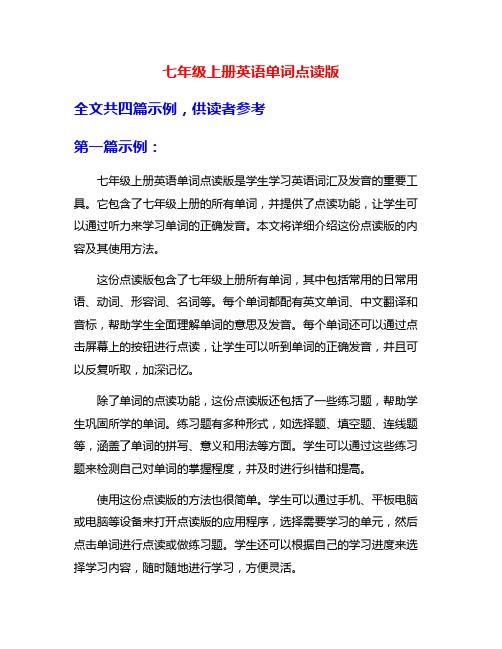
七年级上册英语单词点读版全文共四篇示例,供读者参考第一篇示例:七年级上册英语单词点读版是学生学习英语词汇及发音的重要工具。
它包含了七年级上册的所有单词,并提供了点读功能,让学生可以通过听力来学习单词的正确发音。
本文将详细介绍这份点读版的内容及其使用方法。
这份点读版包含了七年级上册所有单词,其中包括常用的日常用语、动词、形容词、名词等。
每个单词都配有英文单词、中文翻译和音标,帮助学生全面理解单词的意思及发音。
每个单词还可以通过点击屏幕上的按钮进行点读,让学生可以听到单词的正确发音,并且可以反复听取,加深记忆。
除了单词的点读功能,这份点读版还包括了一些练习题,帮助学生巩固所学的单词。
练习题有多种形式,如选择题、填空题、连线题等,涵盖了单词的拼写、意义和用法等方面。
学生可以通过这些练习题来检测自己对单词的掌握程度,并及时进行纠错和提高。
使用这份点读版的方法也很简单。
学生可以通过手机、平板电脑或电脑等设备来打开点读版的应用程序,选择需要学习的单元,然后点击单词进行点读或做练习题。
学生还可以根据自己的学习进度来选择学习内容,随时随地进行学习,方便灵活。
七年级上册英语单词点读版是一份非常实用的学习资料,对学生学习英语单词和提高听力能力都有很大帮助。
学生可以通过这份点读版来系统地学习单词,巩固知识,并在日常生活中运用所学的单词,提高英语水平。
希望同学们能够认真使用这份点读版,取得好的学习成绩。
第二篇示例:七年级上册英语单词点读版是一本非常重要的教材,它涵盖了七年级学生需要掌握的基本词汇和语法知识。
这本教材的特点之一是每个单词都附带有发音,让学生可以通过点读的方式来练习发音,并且加深对单词的理解和记忆。
在七年级上册英语单词点读版中,主要包含了各种日常生活和学习中常用的单词,例如数字、颜色、家庭关系、动物、食物、交通工具等。
通过学习这些单词,学生可以在日常交流中更加流利地表达自己的意思,同时也为后续的英语学习打下坚实的基础。
新版人教版七年级全册英语单词表(含音标)可打印
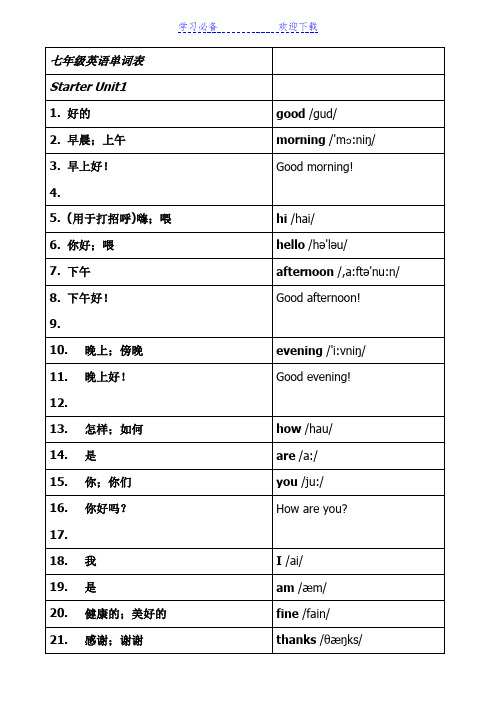
please /pli:z/
Starter Unit3
1. 颜色
color /'kʌlə/
2. 红色(的)
red /red/
3. 黄色(的)
yellow /'jeləu/
4. 绿色(的)
green /gri:n/
5. 蓝色(的)
blue /blu:/
6. 黑色(的)
black /blæ k/
7. 白色(的)
8. 他的
his /hiz/
9. 我的
mine /main/
10. 她的
hers /hə:z/
11. 原谅;宽恕
excuse /ik'skju:z/
12. (I 的宾格)我
me /mi:/
13. 劳驾;请原谅
excuse me
14. 感谢;谢谢
thank /θæŋk/
学习必备
欢迎下载
15. 老师;教师 16. 关于 17. (询问消息或提出建议)..怎么样? 18. 19. 你的;你们的 20. 为了;给;对 21. 为......而感谢 22. 帮助;援助 23. 受欢迎的 24. 别客气。 25. 棒球 26. 表;手表 27. 计算机;电脑 28. 游戏;运动;比赛 29. 卡片 30. 学生卡;身份证 31. 笔记本 32. 戒指 33. 袋;包 34. 在......里 35. 图书馆 36. 请求;要求;询问
欢迎下载
29. (用以介绍人或物)这就是;在这里 here /hiə/
30. 照片
photo /'fəutəu/
31. 属于(人或物);关于(人或物)
of /ɔv, əv/
32. 下一个(的);接下来(的)
初三(九年级)英语听力材料级答案.doc

初三(九年级)英语听力材料级答案(一)听句子,选画面。
你将听到五个句子,请你根据所听到的内容,选择与画面内容意思相符的选项。
每个句子仅读一遍。
1.Many people like doing sports. Look! Some people are riding bikes to keep healthy.2.This kind of animal is so lovely. Its name is koala and it lives in Australia.3.In recent years, mobile phone is very popular in China.4.Every year many trees are planted on March the twelfth.5.The Sixteenth Asian Games was held in Guangzhou last year.(-)听句子,选答语。
你将听到五个句子,请你根据所听到的内容,选择恰当的答语。
每个句子仅读一遍。
6.How old is your grandmother?7.What color are the pants?8.I'm so happy. I'm going to study in a new school this September.9.Thank you for showing me your family photos.10.Do you often play computer games?(三)对话理解。
(A)你将听到五段对话及五个问题,请你根据所听到的每段对话内容及问题,选择正确的答案。
每段对话和问题读两遍。
11.W: What time do you usually get up, Tom?M: Um, I usually get up at five o'clock.Question: What time does Tom usually get up?12.W: What day was it yesterday?M: It was Thursday.Question: What day is it today?13.W: Did you go to the film last Sunday?M: Yes, I went with my parents, and my brother Jerry.Question: How many people went to the film?14.W: Why do you go to school so early, Jack?M: I have to take an English exam this morning. I'm not ready for it.Question: Why does the boy go to school so early?15.M: Amy, you don't look very well. What's the matter?W: I have a cold.Question: How is Amy?(B)你将听到一段对话及两个问题,请你根据所听到的对话内容及问题,选择正确的答案。
人教版七年级英语单词带默写音标
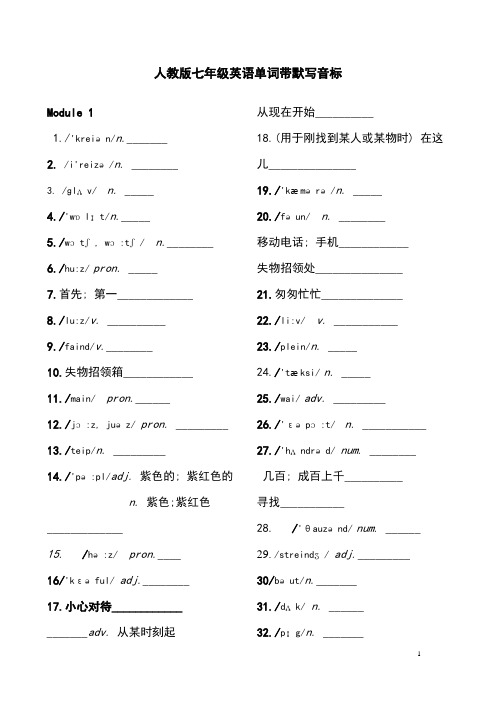
人教版七年级英语单词带默写音标Module 11./'kreiən/n._______2. /i'reizə/n. ________3. /ɡlʌv/ n. _____4./'wɒlɪt/n._____5./wɔtʃ, wɔ:tʃ/ n.________6./hu:z/pron. _____7.首先; 第一_____________8./lu:z/v. __________9./faind/v.________10.失物招领箱____________11./main/ pron.______12./jɔ:z, juəz/pron. _________13./teip/n. _________14./'pə:pl/adj.紫色的; 紫红色的n.紫色;紫红色_____________15./hə:z/ pron.____16/'kεəful/ adj.________17.小心对待___________________adv.从某时刻起从现在开始__________18.(用于刚找到某人或某物时) 在这儿_______________19./'kæmərə/n. _____20./fəun/ n. ________移动电话; 手机____________失物招领处_______________21.匆匆忙忙______________22./li:v/ v. ___________23./plein/n. _____24./'tæksi/n. _____25./wai/adv. _________26./'εəpɔ:t/n. ___________27./'hʌndrəd/ num. ________几百; 成百上千__________寻找___________28./'θauzənd/num. ______29./streindʒ/ adj._________30/bəut/n._______31./dʌk/n. ______32./pɪg/n. _______33./'sɒsɪdʒ/ n. _________ Module 21./pleɪ/v. _____2./'tenɪs/n. _______3./pɪ'ænəʊ/n. ________4./raɪd/ v. _____5./klʌb/n._____6./tɜːm/ n._____7./bɔːd/n._______________想要; 希望8./wel/ int._____9./ɔːl/adj._________________仅此而已10./'wʌrɪ/v. ____11. ________担心……12./tiːtʃ/v. ________13./ðen/ adv.______14./'mɒnɪtə/ n. __________15./stɑːt/n._________________与某人相处融洽16./'redɪ/adj. ______17. ____________ 乐于做某事18./'prɒmɪs/ v. ____19./fɑːst/ adv. ______adj.快的; 快速的20./fɪt/ adj. _______21./dʒʌst/adv. ________22./bɔːl/n._________23./geɪm/n._______24./tiːm/n. ______25./best/adj.______26./skɔː/ n.得分; 成绩27/'taɪdɪ/adj.____________v.收拾; 整理28./ʃɔː; ʃʊə/ adj. _____29./'evrɪbɒdɪ/pron. ___________正如; 正像30./'bjuːtɪfʊl; -f(ə)l/ adj. ______31./flaɪ/ v. ( flew ) ________32.kaɪt/n.______33./swɪm/v. ________Module 31.复习;练习__________2./'pɪknɪk/ n. ______3./'haʊswɜːk/ n._____4.prep.在……时候_____5./els/adv. _____6./'nəʊbədɪ/pron. ________7.__________prep.在……点钟8./'nʌθɪŋ/ pron._____9./'sɪlɪ/adj. ____10./fæn'tæstɪk/adj. ______11./'fɔːwəd/ adv. __________________盼望12./fæn/ n._____13.__________交朋友14./ʃɜːt/ n. ______15./tʃɪə/v.________16./'pleɪə/n. _____17./həʊp/v. __________18./wɪn/v. ____________________过得愉快19./maɪ'self; mɪ'self/pron. _____20./'djʊərɪŋ/prep. ___________ /meɪ/n. _______ 21._________五一劳动节22./leɪt/adv._____adj.迟的; 晚的23./wɔːk/ n. ___________________散步24./'kʌntrɪ/n.______25./'sek(ə)nd/ num. _________26./kə'lekt/v.______27./'lɪtə/n. __________28./fʌn/ n.______29._________暑假30./kæmp/ n. ______31./ɒ'strelɪən/adj. _________32./'saɪtsiːɪŋ/ n. ______33.__________观光34./biːtʃ/ n.______35./'ɜːlɪ/ adv.___________adj.早的Module 41./tʃɔːk/n._____2./'ruːlə/ n. ________3./'kærɪ/ v. ______4./tʃeɪn(d)ʒ/ v. & n._______5./'evrɪθɪŋ/ pron. _______6./'fjuːtʃə/n. ___________________将来7./laɪf/ n. _____8./niːd/v. & v. aux.______9./wɪl/v. aux. _____10./'meɪbɪ/ adv. _______11./ɑːsk/ v. _____12./'kwestʃ(ə)n/ n. __________13./baɪ/prep.______14./'levl/n. _____15./'eɪbl/adj. ____________能够做……16./mɔː/ adv. _____adj.更多的17._______不再……18./friː/adj. ______19./eə/n. _______20./lænd/n. ______21./mə'ʃiːn/n._____22./reɪn/n.雨; 雨水v.下雨23./'rəʊbɒt/n. _____24./siː/ n.______25./speɪs/ n.26./'træfɪk/n. ____27./dʒæm/n._______________交通堵塞28./wɪnd/n. _____29./truː/ adj. _______________(希望、梦想等)现,成真30.__________(用于介绍某人或某物)下面31./baɪk/n. _________32./kɑː/n. ______32./tʃiːp/adj._____33./'evrɪweə/ adv.______34.不仅……而且……____________35./'ɪntʊ; 'ɪntə/prep._______36./lɒŋ/adj. ______37./'hevɪ/adj. _______38./laɪt/adj. ______39./'iːzɪ]/adj. _________40./'wɜːkɪŋ/ adj. __________41./'aʊə/ n. ______42./ʃɔːt/adj.______43./raɪz/ v. _______44.______和; 又; 也Module 51./'mɑːkɪt/n. _______2./'suːpəmɑːkɪt/n.________3./'bɪskɪt/ n. _____4./'lemən/n.________5./'strɔːb(ə)rɪ/n._________ ___________母亲节6./saɪz/n. ______7./teɪk/v. ________8./meɪ/v. aux. _____9./traɪ/ v. ____________________试穿10./'sɜːtnlɪ;]adv. _____11._________别急;稍等一会12./seɪl/ n. ______13./praɪs/n._________14/lʊk/ v. _________14./freʃ/adj. ______15./əd'vɑːntɪdʒ/n. ________16./'enɪwʌn/___________17./'enɪθɪŋ/pron. ______ 18/'enɪweə/adv._____19./kəm'peə/v. ____20./peɪ/v.______21./pəʊst/n. & v.______22./'prɒdʌkt/n.______23./rɪ'siːv/v. ______24./seɪf/adj. _25./'sev(ə)r(ə)l/adj._______26./ɒn'laɪn/adj.______27./'ʃɒpɪŋ/n.______28./weɪ/n. ________29.________ ... ......之一30./'ɔːlməʊst/adv. _________31./'sʌmθɪŋ/pron. ____32./'leɪtə/ adv. _______33./'əʊp(ə)n/ adj. ______34./aʊt/adv. _______________外出; 游玩35./'əʊvə/prep. ______________ 总有一天36./wʌn/ pron. _______Module 61./bæŋk/n. ______2./mju'zi:əm/ n.________3./ə'lɒŋ/ prep. _____4./ə'krɔs/ prep.______5./krɔs/ v. ____6./'ɔpəzit/prep. _________7./'tʊərist/n. ______8./ik'skju:s/v. __________________劳驾,对不起(用于礼貌地引起某人的注意)9./stri:t/n. ______10./tə:n/v. _________11./θɜ:d/ num. ______12./'gaidbʊk]/n.________13./'bʊkʃɒp/n. __________14./raɪt/ int. ______15.________为什么不……呢16./kʊd/ v. aux.______ 17./ˌʌndə'ɡraʊnd/ n. ______18./teik/ v.________19./tuə/n.______20/skweə/ n.______21./'midl/ n. _______adj.22./'feiməs/adj.________23./'peintiŋ/ n.____________24./frəm/ prep. ______24./'mi:tə/ (Am E meter) n.________25./ə'bʌv/prep. ______26./'rivə/ n.________27./kliə/ adj. ______28./bridʒ/n. _________29./'reilwei/ n.______30./pɑ:st/prep.______31/tʃɜ:tʃ/n. ______31./'finiʃ/v. _______32./hai/ adj. ________33./pəust 'ɔfis/邮政局34./ʌp/ prep. __________.35./daʊn/prep. _____36./stɔp/ n. _____Revision Module A/hɔːs/ n.______Module 71./bɔːn/_____adj.2./strɪkt/ adj. 严格的; 严厉的3./'fren(d)lɪ/adj. __________4./'praɪmərɪ/adj.__________________小学5./taʊn/n._______6.______ 美国7./heɪ/ int. _____8./'vɪlɪdʒ/n.________9./naɪs/adj. ______10./gʊd/adj. __________11./'dɪfɪklt/adj. _______12./'bɑː,θruːm/n. ________13./'bedruːm/n. ____14./'gɑːdn/n. ______15._______ 起居室; 客厅16/iːst/adj.-_______n.16./kəʊst/n.______17./ə'gəʊ/adv. ___________18./stɔː/ n._____19._____________电影院20.bɔːd/adj. ____________21./'prezɪdənt/n.______22./'kʌmftəbl/adj. _______23./leɪk/n. ______24./lɑːst/ adj. (星期、月份等)最近过去的,紧接现在前面的_______ 25./leɪk/adv. __________Module 81./heə/n. _____2./ɡəuld/n. __________3./'fɒrist/ n. _____4./wʌns/adv.__________5./ə'pɔn/prep. _____6. _________从前7./di'said/v. 决定___________散步7./'bɑ:skit/n. _____8./'nəʊtis/ v. __________________独自一人的9./dɑ:k/adj. _____10./pik/v.______________拿起; 举起11./su:n/ adv. ______12./lɒst/a dj._______13/ə'raʊnd/prep._____14./'litl/ adj. 小的15./tə'wɔ:dz/ prep.______16./nɔk/v.______17./dɔ:/n.______18./'ɑ:nsə/ v. ________19./pʊʃ/v. _____20./'entə/v. ____21./bəʊl/ n. _____22./'hʌŋgri/adj.________23./rait/adj.________24./'finiʃ/v._________25/'aiðə/adv. _____ 26./pi:s/ n. ______________破碎27./ə'sli:p/adj. _____ 28./ri'tɜ:n/ v. _________29./krai/ v. _____30.________起初; 首先31./pɔint/ v. ______32._________指着……33./ʃaʊt/ v._______34./dʒʌmp/v. ________35./wi'ðaʊt/prep. ___________36./pɑ:t/ n. ______Module 91./mɑːtʃ/n. ________2./'eiprəl/n. _____3./dʒu:n/ n. ___________________妇女节___________国庆节____________儿童节4./dʒʊˈlaɪ/n. ___________5./ɔː'gʌst/n. _____6./sep'tembə/n._____7./ɒk'təʊbə/n. ________8./nəʊ'vembə]n. _____9./dɪ'sembə/n. _________10./'raɪtə/n.______11._________发现; 查明; 弄清12./riːl/adj.__________________ 在……岁时13./'njuːzpeɪpə/ n._________14./ɪg'zækt/adj. _________15./ɪg'zækt/n.______16/bɪ'kʌm/ v.__________________ 在19世纪60年代17./pleɪ/ n. __________18/'pəʊɪm/n.________19./'mærɪ/v. __________20./sək'sesfʊl/adj. ______21./wɜːk/n.______22./bɪld/v. _____________prep. 在……河边23./'faɪə/ n.__________24./daɪ/v. ______25./rɪtʃ/adj. ______26./'læŋgwɪdʒ/n. __________ ____________ 世界各地27./jʌŋ/adj. ___________Module 101./pə'sɪfɪk/adj. _____________2./səʊ/adv._______3./ges/v. ___________4./ɪk'saɪtɪd/adj. ______5./waʊ/ int._____6./ə'raɪv/v. _____7./rɪ'læks/v. ______8./,wɜːld'feɪməs/adj.____________9./frentʃ/ adj. 法国的; 法语的n. 法国人; 法语__________10./sel/ v. ______11./tɒp/n. ______12./tɪl/conj. _________13./laɪt/n.______14./ɒn/adv.______15./'wʌndəfl/adj. __________ 16/'pæləs/ n._________Module 111./baʊ/v. ______2./kɪs/v. & n. ________3./ʃeɪk/v. ____________________握手3./smaɪl/v. & n._____4./'brɪtɪʃ/adj. __________5./'dʒɜːmən/n. _________adj.6./,dʒæpə'ni:z/n.___________adj. 日本的; 日语的;日本人的7./'rʌʃən/n. 俄罗斯人; 俄语adj. 俄罗斯的; 俄罗斯人的; 俄语的______________8./'vɪzɪtə/ n._______9./'rʌʃə/_______10./wɒt/int. 什么(表示惊奇)______11./nɒd/v. ____12./hed/n._____13./hʌg/v._______14/iːtʃ/pron. ___________________互相; 彼此15/'ɪndɪə/____________15./tə'geðə/adv. ______16./'mauri/ adj. _________17./tʌtʃ/v. ______18./nəʊz/ n.______19./'fɪŋgə/n. ______20./fʊt/ n. ______21./niː/n._____22./leg/n._____23./maʊθ/n. ________24./'bɒdɪ/ n. ______25./'fɒrɪn/ adj. ________________ 北美人26./'pɜːsnəl/ adj.________27./ɑːm/n. _________________臂挽臂地____________南美人28.________həʊld/_____29./muːv/______30./'brɪtn/______31.___________ 一点也不32./pə'laɪt/adj.______33./'sʌmweə/adv. ________34./weɪv/v.____________35./fækt/n. ___________________事实上36./ruːd/adj. __________37./brɪŋ/v. __________Module 121./'laɪvlɪ/adj. /______2./'mɒd(ə)n/adj.________3./'nɒɪzɪ/adj. ______4./pɒp/( = popular ) adj._______5./rɒk/n. _____6./saʊnd/ n._______7./,vaɪə'lɪn/n. _________8./'westən/adj. _________9./baɪ/ prep. ________10./θruː/prep. _____11./bəʊθ/pron._____12./'ɒpərə/n. _____13./vɒɪs/n._____14./drʌm/n._____15./bɪ'liːv/v. _______16./mju'zɪʃn/ n._______17./'sentə/n. ______18./jʊərə'piːən/adj._____19./'klæsɪkl/adj. ______20./'sentʃʊrɪ/n. _____21./kəm'pəʊzə/ n. ______22./'eldə/adj._____23./wɔːls/ n. ______24.________舞曲25./ə'nʌðə/pron. _________26./piːs/ n. ______27./pɔː/ adj.______28./'pɜːfɪkt/adj._____29./sæd/ adj. _____Revision Module B1./sləʊ/adj. _____2./fiːl/v. ( felt ) 感觉; 觉得3./ʃɪp/ n.________11。
- 1、下载文档前请自行甄别文档内容的完整性,平台不提供额外的编辑、内容补充、找答案等附加服务。
- 2、"仅部分预览"的文档,不可在线预览部分如存在完整性等问题,可反馈申请退款(可完整预览的文档不适用该条件!)。
- 3、如文档侵犯您的权益,请联系客服反馈,我们会尽快为您处理(人工客服工作时间:9:00-18:30)。
七年级—九年级听力单词拼写Ⅴ.听短文,根据短文内容,完成表格。
短文读三遍。
Liu Mei is in England now. She is from China. Her English name is Jane. She is seventeen years old. She is in Class Two. Her telephone number is 6900-2535.Ⅴ.听短文,根据短文内容,完成表格。
短文读三遍。
(5分)Ⅳ.听短文,根据短文内容,完成表格。
短文读三遍。
(M:)I am Jack. I am from America. Please look at this photo. The tall boy is me. My shirt is red. My pants are blue. My cap is yellow. My shoes are black and white. Am I cool?Ⅳ.听短文,根据短文内容,完成表格。
短文读三遍。
(5分)Ⅳ.听短文,填入所缺单词,每空一词。
短文读三遍。
The boy is from Japan. He has big eyes and a small nose. He is short and has yellow hair. He is in a white coat and black pants. Please help his mom find him.Ⅳ.听短文,填入所缺单词,每空一词。
短文读三遍。
(5分)The boy is from Japan. He has big eyes and a 16 nose. He is 17 and 18 yellow hair. He is in a 19 coat and black 20 . Please help his mom find him.Ⅴ.听短文,根据短文内容,完成表格。
短文读三遍。
(W:)My name is Lucy. I’m eleven years old. I’m from England. I’m a student. This is my family. My father is a doctor. My mother is a teacher. She teaches English in a school. I have a happy family.Ⅴ.听短文,根据短文内容,完成表格。
短文读三遍。
(5分)Ⅳ.听对话,根据对话内容,完成表格。
对话读三遍。
Lucy:Hello!Jim: Hello! This is Jim. May I speak to Lily?Lucy: Oh, sorry. She isn’t in now.Jim: Could you ask her to fly kites with me tomorrow?Lucy: All right. I’ll tell her.Jim: Thank you.Lucy: You’re welcome. Goodbye.Jim: Bye.Ⅳ.听对话,根据对话内容,完成表格。
对话读三遍。
(5分)Ⅴ.听短文,根据短文内容,完成表格。
短文读三遍。
Liu Mei gets up at 7:00, and she has breakfast at 7:30. Then she goes to school at 7:50. At 12:15she has lunch at school. At 5:00 in the afternoon she goes home with her friend. She often helps her mother cook dinner. She does her homework at 7:00. She is a good girl.Ⅴ.听短文,根据短文内容,完成表格。
短文读三遍。
(5分)Liu Mei’s DayⅤ.听短文,根据短文内容,完成表格。
短文读三遍。
It’s Sunday morning. Bob, Nick, Jim and Linda, with their English teacher, Mr. Green, go to the zoo. The students tell Mr. Green about their favorite animals. Monkeys are Nick’s favorite animals. He thinks monkeys are clever. Bob thinks elephants are his favorite animals. T hey’re so kind. Lions are Jim’s favorite animals. Pandas are Linda’s favorite animals. What about Mr. Green? His favorite animals are tigers.Ⅴ.听短文,根据短文内容,完成表格。
短文读三遍。
(5分)Ⅴ.听对话,根据对话内容,完成表格。
对话读三遍。
W: Jack, would you help me do some shopping?M: Sure. What do we need?W: We need three kilos of eggs and some juice.M: How many bottles of juice do we need?W: Five bottles. Oh, we don’t have any rice.M: How much rice?W: Two bags of rice.M: Is that all?W: Let me see. Mm, six kilos of oranges and two kilos of apples.M: OKⅤ.听对话,根据对话内容,完成表格。
对话读三遍。
(5分)Shopping ListⅣ. 听短文,完成下列表格。
短文读两遍。
Jim is 13 years old. He often goes to school on foot. Sometimes he goes to school by bike. He gets up at half past six in the morning. Tom is 14 years old. He usually goes to school by bike. He seldom goes to school on foot. He gets up at seven. Mary is 15 years old. She often goes to school by bus. She never goes to school by bike. She gets up at a quarter to seven.Ⅳ. 听短文,完成下列表格。
短文读两遍。
(5分)成下列表格。
短文读两遍。
Look! This is my study. There’s a picture on the wall. A desk is in front of the window. We can see some books on it. Oh! My bag is under the chair. My pencil-box is on the desk, too. We cansee some pens, pencils, an eraser and a ruler in it. There is a clock on the wall near the window.And we can see a ball. It’s behind the door.Ⅳ. 听短文,完成下列表格。
短文读两遍。
(5分)Ⅳ. 听短文,把句子补充完整。
短文读两遍。
My friend Jerry lives far away from his school. It’s about 12 kilometers from the school. He usually gets up at six o’clock in the morning and has breakfast at 6:05. Then he goes to school at six twenty. He rides a bike tothe bus stop first. Then the No. 105 bus takes him to the school. Ⅳ. 听短文,把句子补充完整。
短文读两遍。
(5分) 16. Jerry’s home is _____ _____ from his school. 17. He usually goes to school at ______.18. Jerry’s home is _____ kilometers away from the school. 19. He usually goes to school _____ _____ and _____ _____. 20. He takes the Number _____ bus to the school. Ⅳ. 听短文,完成下列表格。
短文读两遍。
Welcome to CCTV Weather Report. Tomorrow Beijing will be sunny and warm. The temperature is 5℃ to 7℃. Tokyo is rainy. The temperature is 0℃ to 3℃. New York is cold. The temperature is 8℃ to 10℃. Sydney is hot and sunny. The temperature is 20℃ to 25℃. Ⅳ. 听短文,完成下列表格。
短文读两遍。
(5分)Ⅲ. 听对话,完成表格。
对话读两遍。
W: Is everyonehere today? M: No, Jim isn’t here.W: What’s the matter with him?M: He has a bad toothache.W: I’m sorry to hear that. When did it start?M: Three days ago.W: Did he go to the hospital?M: Yes, he went to the dentist’s. I think he had better not eat too much candy.W: I agree with you.Ⅲ. 听对话,完成表格。
